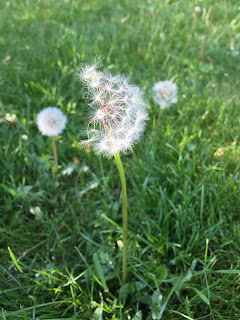Recently, I met someone for drinks who’s looking to change
careers — the current colleague of a former colleague of mine. This young woman
wants to work in communication (specifically writing and nonprofit marketing),
so she asked me about my experience in the field. Beyond telling her the
specifics about what I did at my previous jobs, I also give her some
bigger-picture advice because I could sense how nervous she was at the thought
of making this change.
I don’t like change, I don’t seek it out, but I’ve learned
over the years how to roll with it and how to appreciate its role in developing
me as a human being. I’m also going through a career change right now, having
left my job as an editor to pursue a degree in library and information science.
So when I experienced a period of doubt and dread the other day, I thought back
to what I told this woman and started writing this post as a way to remind
myself take my own advice. I’m sharing it here with the hope that it may be
helpful to others, too.
 |
| Maple trees budding and turkey vultures soaring one afternoon in May. |
Advice to a Young Writer (or Anyone in Transition)
Let yourself pause.
Give yourself time between one thing and the next to
regroup. If you’ve just gone through a major life change, don’t expect the next
thing (job, partner, etc.) to appear immediately. Both experience and research
show that
our brains need downtime, time to “do nothing,” to stare out the window —
creativity never happens without this, and you’ll never truly figure out what
you want if you jump anxiously and too quickly to the next thing. This type of
downtime is necessary on a daily or weekly basis, but I think it’s also
necessary on a larger time-scale. For example, I recently left a job I had for
six and a half years… maybe I will need more than a month or two to regroup
from that.
Be curious and open, but also grounded.
Especially important, don’t always believe your first
impressions. Opportunities are everywhere, and they often aren’t what you initially
think they are. It may be that someone you don’t find interesting when you
first meet her turns out to be one of your most beloved, long-term friends and
that knowing her also leads to multiple doors opening in your professional life
(true story). Do your best to suspend judgement about people and situations you
encounter, and try not to shut any metaphorical doors. Likewise, you may be
able to help someone else in a significant way through very little effort on
your part, simply by keeping an open mind and staying in touch with yourself.
Doing both of these things at once is what helps you be a genuine person.
Volunteer your time and skills.
Whether you’ve just moved to a new place and don’t know many
people or you find yourself with extra free time due to a job loss or breakup,
volunteering is a great way to get out and stay active and engaged. Animal
shelters, libraries, food banks, museums… it shouldn’t take long to find an
organization that’s doing something related to an interest of yours.
Volunteering will give you something to occupy your time and attention, even if
it’s just once a week — and who knows what it could lead to? I know more than a
couple people who’ve gotten a job or made a good friend through their volunteer
work.
Do your best, no matter how humble the task.
In other words, stay present. If you’re volunteering (or
doing anything, really), don’t focus too much on the future or on how what you’re
doing now could lead to something “better.” An activity like folding a mountain
of laundry or stuffing hundreds of envelopes can be its own reward if you know
it’s for a good purpose and you do it mindfully. This is a variation on the
concept that “life is what happens to you while you’re busy making other
plans.” (Side note: I thought that was John Lennon’s creation, but it turns out
he wasn’t the first to say it.) Our culture has seen so many people rise to near-instant
success or fame in the past few decades that steadily improving your work over
time, patiently working your way up to something, may seem old-fashioned. But
it’s still the most likely option for most of us — so try to make peace with
it.
Create your own learning opportunities.
One of the realities of job-seeking is that organizations
want to hire people with experience. So you need to go out there and get some. For
someone who wants to eventually get paid to write, the most important thing is
to
write. Now. Offer to edit someone’s newsletter or help a friend write
copy for their website — or pick a topic and start your own blog. If what you
want to be paid for isn’t as easy to do solo as blogging, see if you can do
something adjacent to what you’re interested in. At the very least, read widely
in your field of interest, whether it’s books, blogs, or social media posts.
Don’t wait for someone else to give you permission to learn how to do the work you
want to do —
adopt a growth mindset. Take charge and see how far you can get on your own until
you find an opportunity to take it further.
Good luck :)








